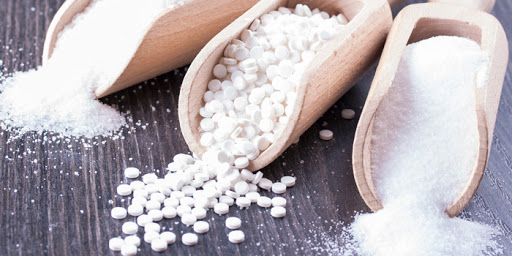
A food additive is a substance not naturally found in a food or drink but added in processing or preparing it. Additives are used for several reasons, including to help prepare the product, preserve it, make it look more appealing, and/or enhance flavor.
Additives can be either synthetic-based or natural, and some are harmless. But certain additives, especially those common in processed foods, have been linked to health problems.
Here are four food additives you should consider eating in limited amounts.
1. Artificial food colors
Artificial food colors are found in many foods, from brightly colored frosting to yogurt. They are added to enhance or change color.
According to the American Academy of Pediatrics, studies over the last several decades have raised concerns that artificial food colors affect children's behavior and exacerbate ADHD symptoms.
2. Nitrates and nitrites
Nitrates and nitrites are often found in cured and processed meats, fish, and cheese, and they are linked to cancer in the digestive and nervous systems.
The World Health Organization classifies processed meats as carcinogenic partially due to added nitrates or nitrites in the curing process. The classification came after reviewing over 800 scientific studies. Studies indicate processed meats with nitrates increase the risk of colorectal cancer in particular.
Meats like hot dogs and bacon often contain sodium nitrites, but you can look for versions that are nitrite-free, Lemond says. However, nitrate-free versions still contain naturally occurring sources of nitrates so it is unknown if these are actually safer.
3. Sulfites
Sulfites are naturally occurring in some whole foods, but they are also added as a preservative to slow discoloration. Foods with sulfite additives include packaged gravies, biscuits, and pizza dough, and even dried fruit, Lemond says.
If you have a sensitivity, avoid ingredients that contain sulfites, which sometimes go by names like Sulfur dioxide, Potassium bisulfite, Sodium sulphite, Sodium bisulfite
4. Artificial sweeteners
Artificial sweeteners are synthetic sugar substitutes added to sweeten foods and drinks, most commonly soft drinks, dairy products, jams, and jellies. They are especially found in products labeled "diet" or "sugar-free," as they add virtually no calories.
Common artificial sweeteners include: Saccharin (Sweet and Low), Aspartame (NutraSweet and Equal) Sucralose (Splenda)
Although artificial sweeteners were developed to reduce obesity and insulin resistance, a 2017 review found they may actually contribute to the obesity epidemic. That's because they reduce feelings of fullness, leading to an increase in calorie consumption, and thus, weight gain.